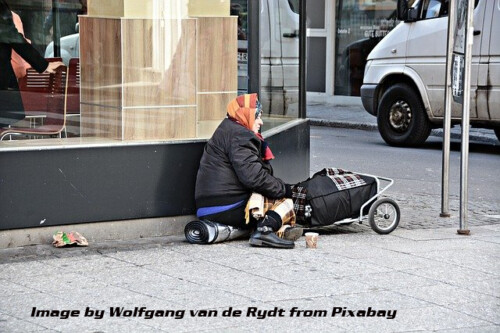Homelessness & Health
(To stay on page right-click links to open in a new tab)
Homelessness affects both physical and mental health and makes accessing health care difficult. As a result, people experiencing homelessness often face higher rates of poor health outcomes than people with housing. Public health tools are particularly important to protect the health of people experiencing homelessness and support the end of homelessness.
About Homelessness

What is homelessness?
Homelessness can be defined in several ways. Commonly, people are considered to be experiencing homelessness if they stay in a shelter, live in transitional housing, or sleep in a place not meant for human habitation, such as a car or outdoors. Sometimes people are considered to be experiencing homelessness if they are living in a motel or are doubled up with family or friends because they do not have anywhere else to stay. To learn more about homelessness, visit the U.S. Department of Housing and Urban Development’s website: FAQs: Homeless (U.S. Department of Housing and Urban Development)external icon
Who experiences homelessness?
Each year, the U.S. Department of Housing and Urban Development (HUD) conducts a Point-in-Time Count (PIT) to estimate the number of people experiencing homelessness in the United States. View Point-in-Time Count and Housing Inventory Count (HUD Exchange)external icon for more information about the PIT count and previous years’ data.
According to the data from these counts, most people experiencing homelessness stay in homeless shelters. Around 40% of people experiencing homelessness live in unsheltered locations (such as in a car or outside). Almost one third of people experience homelessness as a family. People who are Black or African American and those who are American Indian or Alaska Native have higher rates of homelessness.
People experiencing homelessness are at increased risk for infectious and non-infectious diseases. Homelessness is known to increase the risk for infectious diseases such as Viral Hepatitis (especially Hepatitis C), Tuberculosis (TB), Human Immunodeficiency Virus (HIV), and Coronavirus Disease 2019 (COVID-19). People experiencing homelessness also commonly face mental illness, alcohol and substance use disorder, diabetes, and heart and lung disease.
Risk Factors for People Experiencing Homelessness:
- Congregate setting of homeless shelters increases risk for TB and COVID-19
- People experiencing homelessness who use drugs are at an increased risk for Viral Hepatitis, HIV, and other bloodborne pathogens
- People experiencing homelessness are at risk of developing mental illnesses, such as anxiety, depression, and post-traumatic stress disorder (PTSD)
- Delayed care seeking and lapses in care can lead to worse health outcomes, such as severe illness or death
Resources
For People Experiencing Homelessness, there are resources to help you find housing services in your community.
- Contact your local Continuum of Care (CoC) program for homeless assistance. Visit the HUD Exchange website for a contact list: Need Homeless Assistance?external icon
- For a map of HUD Resources, visit: HUD Resource Locatorexternal icon
- The Housing Opportunities for Persons With AIDS (HOPWA) Program is the only Federal program dedicated to the housing needs of people living with HIV/AIDS. Under the HOPWA Program, HUD makes grants to local communities, States, and nonprofit organizations for projects that benefit low-income persons living with HIV/AIDS and their families. For more information, visit the HOWPA website: HOPWA: Housing Opportunities for Persons With AIDS (HUD Exchange)external icon
General Resources
- For information about the United States Interagency Council on homelessness, visit their website:
United States Interagency Council on Homelessness (USICH)external icon - For information on HUD Special Needs Assistance Program (SNAPS, the office that covers homelessness) resources:
e-snaps : CoC Program Applications and Grants Management System (HUD Exchange)external icon - For resources and assistance to support HUD’s community partners, visit HUD Exchange:
Official Website for HUD Exchangeexternal icon - For National Health Care for the Homeless Council resources visit:
Understanding Homelessness (National Health Care for the Homeless Council)external icon - For Homeless Veterans, visit the Veterans Affairs (VA) website for resources:
Homeless Veterans Resources – VA Homeless Programsexternal icon - For U.S. Health Resources and Services Administration information:
Official Website of the U.S. Health Resources & Services Administrationexternal icon
Source: CDC Centers for Disease Control and Prevention

